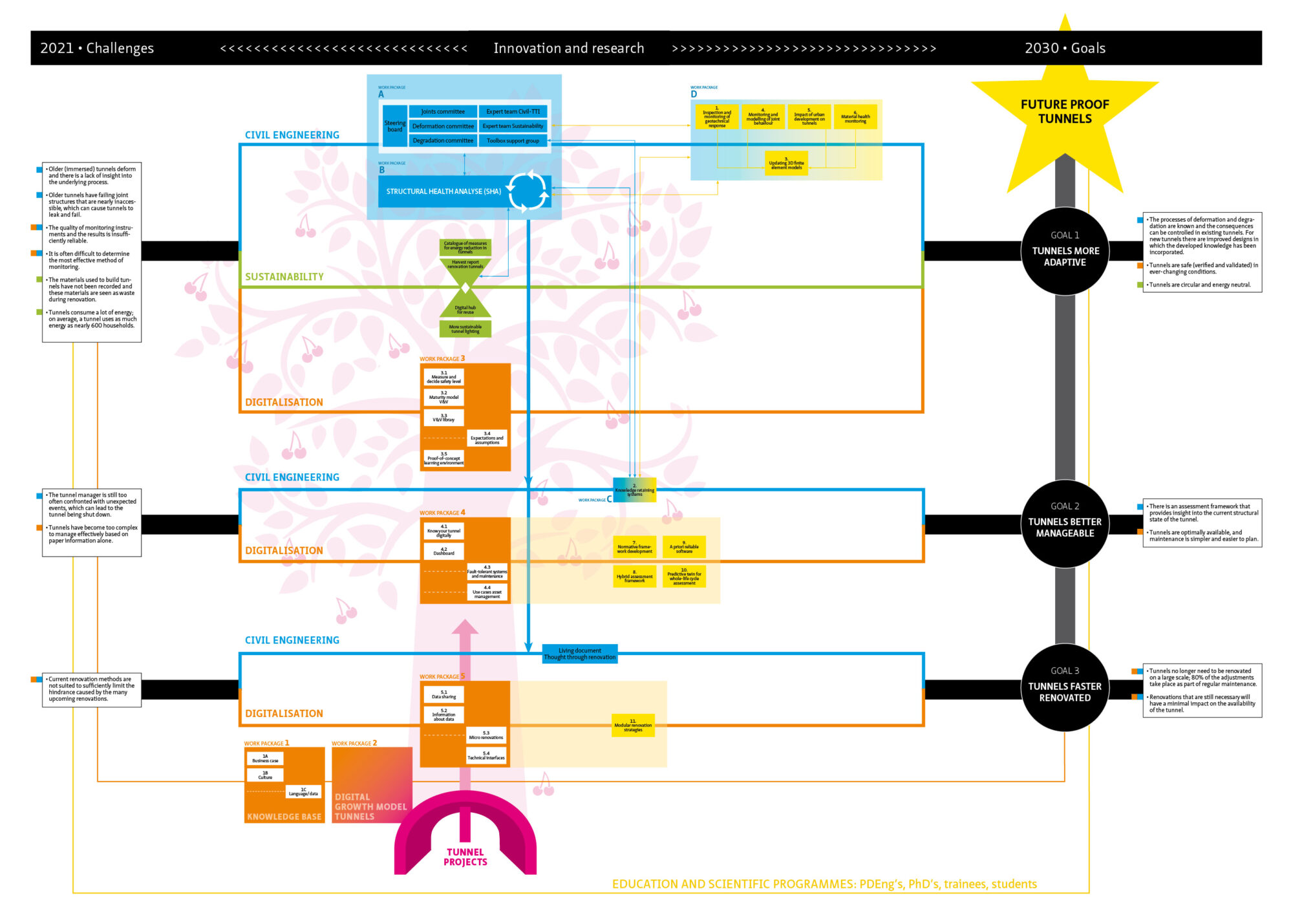Three Ph.Ds wanted for Future proof tunnels
The Center for Underground Construction (COB) has room for three Ph.D. students in the Future proof tunnels research programme. Two of these Ph.D. positions are within the Geoengineering section and the third is within the Materials and Environment section at TU Delft’s Faculty of Civil Engineering and Geosciences.
TU Delft’s Faculty of Civil Engineering and Geosciences has entered into a research collaboration with Centrum Ondergronds Bouwen (COB), the Dutch center for underground space technology and underground space use. The Future proof tunnels research program investigates the challenges of aging underground infrastructure and the upcoming renovations of (usually sunken) tunnels in soft soil conditions.
The current tunnel monitoring standard does not provide sufficient information to analyze the deformation and structural behavior of immersed tunnels. This is partly due to the assumption that deformation during operation would be limited to small-scale vertical deformations due to settlement. However, the limited data available shows that tunnels undergo significant deformations in multiple directions, both vertically and horizontally, resulting in local rotations. Accurate and continuous monitoring of tunnels is necessary to gain insight into the way in which tunnels deform and which external factors play a role. This project rises to the challenge of monitoring tunnel deformation and establishing all external load factors and detailed subsurface data.
Ph.D. project 1
Doctoral project 1 develops a monitoring strategy to continuously monitor tunnel deformations without hindering tunnel operations. This monitoring strategy is applied to several submerged tunnels. In this project, the monitoring data for the different tunnels will be collected, stored in a semantic wiki (or unified database), and used for structural behavior analysis. The monitoring data is then used to predict the long-term behavior of the tunnels and its impact on their structural safety. The candidate is expected to assist in the monitoring program and in the development of the database and analysis methods to convert deformation measurements into structural safety assessments.
>> View position at TU Delft
Ph.D. project 2
Doctoral project 2 aims to identify the main environmental causes for deformation (in different tunnels and scenarios) and to develop realistic 3D subsurface models. This leads to new insights into the interactions between tunnel structure and environment and explanations for observed tunnel behaviour. The candidate is expected to combine historical and new data on geotechnical site conditions and external load conditions into a 3D soil-structure interaction model that captures subsurface heterogeneity.
>> View position at TU Delft
Ph.D. project 3
Doctoral project 3 aims to monitor, explain and predict degradation in tunnels. To this end, monitoring strategies and sensor technologies are being developed and applied in tunnels. By combining monitoring data with existing degradation models, it is possible to predict degradation and provide reliable risk forecasts. The focus of the research is on critical locations such as joints, transitions, and splash zones, where concrete in combination with other materials is also exposed to more extreme loads and/or deformations. The candidate is expected to develop, test, select and install degradation monitoring systems in the tunnel, collect monitoring data and further develop damage models and constitutive descriptions of mechanisms to predict the influence of multiple mechanisms.
>> View position at TU Delft
Deployment project COB-FT1
The COB works together with TU Delft to use the TKI subsidy. The so-called ‘deployment project’ COB-FT1 focuses on the replacement and renovation task for tunnels. The deployment project is the first phase of the overarching research program Future proof tunnels. At the beginning of 2023, the first three PhD students can start with the subprojects Deformation monitoring and database, Geotechnical data analysis and Degradation. Vacancies for this will soon be published on the COB website.
>> Read the project here (pdf, 923 KB)
About the Geoscience and Engineering section
Within the department of Geoscience and Engineering the Section of Geo-Engineering has nine full-time and six part-time academic staff, and 30 Ph.D. and Post-Doctoral researchers. Areas of expertise include soil mechanics, dykes and embankments, foundation engineering, underground space technology, engineering geology, and geo-environmental engineering. There are extensive experimental laboratory facilities, including large-scale soil-structure interaction testing facilities and a geotechnical centrifuge, as well as excellent computing facilities including access to national High-Performance Computing networks.
About the Materials and Environment section
Within the Department of Materials, Mechanics, Management & Design, the Materials and Environment section has 9 full-time scientific staff members, 35 Ph.D., and Postdoctoral researchers. Areas of expertise include micromechanics of building materials, modeling of material behavior, monitoring of material health and sustainability, and sustainability aspects of materials. The section has excellent laboratory facilities for high-level materials research in the Microlab.
The diagram above shows the relationship between the projects of the COB tunnel program and the research projects in Future proof tunnels.








